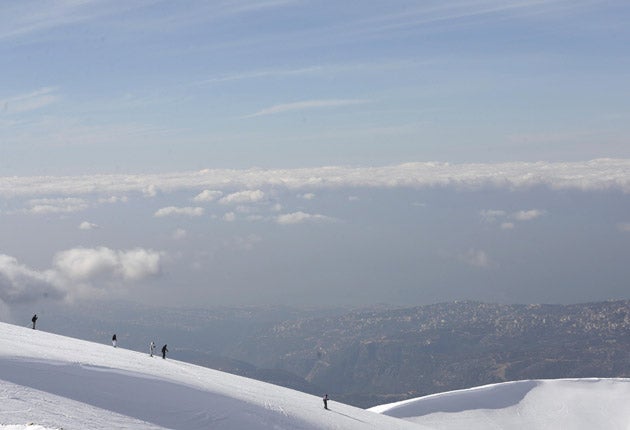Look. You can almost see Beirut
Just two hours from the capital of Lebanon, you can enjoy some good-quality skiing. Minty Clinch reports

"Ah, GSQ," said Sharbel, my host at the San Antonio guesthouse in Mzaar, the closest ski resort to Beirut.
Enthusiasm is Lebanon's default reaction to strangers, but God Save Queens – for that is what GSQ stands for – are not often singled out for such a heart-warming welcome. Or so I thought, but this was early in my long weekend in a holiday playground with myths to explode.
Lebanon is no stranger to explosions or to glamour. The French Mandate in the early part of the 20th century left a second language and added to an existing heritage of great cooking and quality wines from the Beqaa Valley. More recently, a country that has been a melting pot for religions and cultures for at least 5,000 years has endured a bitter civil war (1975-1990), followed by further decades of repercussions as neighbours failed to come to terms with Israel. Lebanon is edgily peaceful nowadays and keen to show its commercial acumen and taste for high living to visitors who are arriving in rapidly increasing numbers.
The country is no stranger to skiing either, again with a Gallic connection because it was popular with the French from the mid-1920s. They accessed the slopes by donkey, with villagers carrying their skis. Today, there are half a dozen resorts in the Lebanon Range, which runs parallel to the coast, but only Cedars and Mzaar have the scope to attract international skiers. The season runs from December to April, but the southerly latitude can shorten it at either end in poor snow years.
In GSQ terms, the sport goes back to the Second World War, when soldiers on leave from North Africa headed to Beirut by train. Some went to Cedars of Lebanon on trips organised by the Army, with tuition by such 1936 Winter Olympians as Jimmy Riddell. Others rented leather boots and hickory skis in town for six shillings a day, hitched to the resort almost 80 miles to the north and hacked up and down as best they could.
Today, Cedars is disappointingly short of the iconic trees that are cunningly used in promotional material. Replanting is a national priority – the cedar appears on the Lebanese flag – but they grow painfully slowly. The new plantations at the Cedars resort stretch down into the valley, but massed cedar wood souvenirs in the shops suggest its future, too, is in jeopardy.
In a ski area that rises from 2,000m to 3,088m, what you see is what you get. The lifts fan out from the base station into the upper reaches of a wide open bowl. The first T-bars, installed in 1953, still work, supplemented in 2005 by triple chairs. Comfort aside, it doesn't matter which you use. They all lead to the same evenly pitched slopes, perfect rip-it-up terrain for skiers and boarders of all standards.
With the regular lifts to the upper slopes closed on the quiet February weekday when I visited, I approached the ancient one-man chair controlled by the army. "It's shut," the guard said firmly, but a £5 supplement to the £20 day pass persuaded him otherwise. As you approach the landing area, the lift plunges round at high speed, making it near impossible for those lacking military agility to download on to a slippery platform. However, the white-knuckle moment was worth it for high traverses, impressive rock-scapes and untracked spring snow.
Mzaar, above the village of Faraya and 25 miles from Beirut, is Lebanon's modest answer to the Three Valleys. With the main village at Junction as the focus, a chairlift goes up to Dome Jabal El Dib for the sweeping descent to Warde, a hamlet with its own nursery lifts. Another chair accesses red and black runs to La Cabane. In the other direction from Junction, there are lifts to the hotel zone, including the ski-in, ski-out Intercontinental.
Eleven, a contemporary boutique hotel, is another chic choice, whereas the San Antonio is more affordable than luxurious. Ron Sayegh, website designer and ski fanatic, has made it his mission to spread the Skileb word, especially in the Gulf States, but also in Saudi Arabia and Russia. Largely due to his efforts, Mzaar is now pleasingly international. It is also an easy day trip from Beirut, which now has convenient flights from Heathrow with BMI, glitzy hotels and mouth-watering restaurants.
My weekend in the new Four Seasons, overlooking the marina and landscaped gardens that stretch down to the sea, ticked all the boxes. On top of skiing, I visited the Roman ruins at Baalbek, the Ksara winery in the Beqaa, the crusader castle at Byblos, grottos at Jeita and Lebanon's only golf course. I worked up an appetite and revelled in dinners at Al Dente, an Aladdin's cave Italian in the Relais & Chateaux Albergo, Eau de Vie; top-notch French food at the Phoenicia; and Sydney's, named after a legendary bartender and open 24/7, at the Vendôme.
On a ski trip to Lebanon, don't bank on losing weight.
Compact Facts
How to get there
Cox & Kings (020-7873 5000; coxandkings.co.uk) offers four nights at the Four Seasons from £1,445 per person, including return flights with BMI, private transfers and B&B. A six-night group tour, taking in Beirut, Tyre, Sidon, Baalbek, Zahle, Anjar, the Ksara winery and Byblos, costs from £1,095 per person, including return flights, B&B, transport and guide. Skileb (00 961 323 6623; skileb.com) offers day trips to Mzaar from £35, including transport, equipment and lift pass, or longer stays by arrangement. BMI (0870 607 0555; flybmi.com) flies daily from Heathrow from £427.
Join our commenting forum
Join thought-provoking conversations, follow other Independent readers and see their replies
Comments
Bookmark popover
Removed from bookmarks